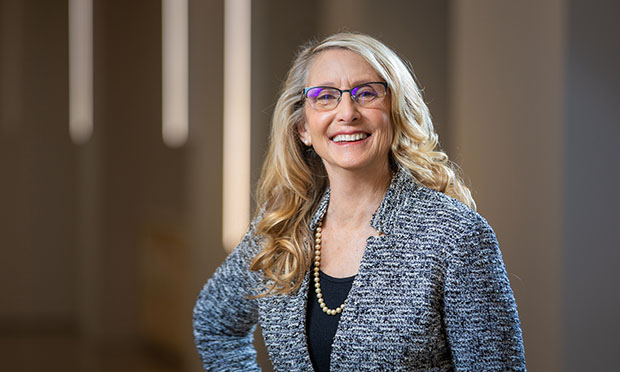Innovations in Diversity and Inclusion: NetApp
NetApp's legal department was one of the drivers in the creation of the Community of Legal Interns. CLI is an organization seeking to connect students and employers committed to increasing diversity, inclusion and innovation in the legal industry.
October 28, 2019 at 07:30 AM
4 minute read
 Connie Brenton, Senior Director of Legal Opperations at NetApp. Photo: Jason Doiy/ALM
Connie Brenton, Senior Director of Legal Opperations at NetApp. Photo: Jason Doiy/ALM
NetApp's in-house legal department collaborated with Southern University Law Center in Baton Rouge, Louisiana, part of the historically Black Southern University System, and a group of companies from across the U.S. to create the Community of Legal Interns. CLI, which already has 1,100 members, roughly 35% of whom are law students, seeks to connect students and employers committed to increasing diversity, inclusion and innovation in the legal industry. The Recorder is recognizing NetApp for its Innovations in Diversity and Inclusion as part of the California Leaders in Tech Law and Innovation Awards on Nov. 6. The Recorder recently caught up with Connie Brenton, the company's senior director of legal operations, who was central to the partnership with SULC.
The Recorder: Quickly walk us through the story of how the Community of Legal Interns came about.
Connie Brenton: This year we built a partnership with Southern University Law Center to increase access, opportunity and ultimately representation from historically underrepresented groups in the legal industry. This was an initiative we designed collaboratively with partners from across the legal ecosystem in response to our belief that we, as an industry, can and must do better. I'm proud that NetApp is leading the way in this important arena.
Community of Legal Interns started with an introduction to Southern University Law Center in Baton Rouge and Chancellor John Pierre where the diverse student body works differently—from the cost of the education to the experiences and innovation afforded the students. They recruit for Grit and Gratitude and are making a difference in the lives of the students, in the community and in the legal industry.
Chronicle (an Alphabet company); Juniper Networks; Keesal, Young & Logan; LexCheck; Liberty Mutual; NetApp; and Walmart have each partnered with SULC. We are collaborating to develop a joint educational experience that is now open to ANYONE (Interns, GCs, legal ops executives, law firm partners, in-house attorneys, service providers, law school deans and career counselors, business school attendees, your internal clients, etc.).
What are the problems that the network is seeking to address?
CLI's mission is to educate, empower and establish future leaders in the rapidly changing legal ecosystem. We are creating a community-based movement to connect students and employers committed to increasing diversity, inclusion and innovation in the legal industry. CLI is seeking to address the problems of a lack of diversity, inclusion and innovation in the legal industry by fostering connections, exposing participants to thought leaders and new technologies, and providing access to rich educational experiences.
How will you measure the success of CLI?
By the end of the summer there were over 1,100 members and each of the 24-speaking series session had between 150 and 300 attendees.
CLI is a certificate program that continues to be leveraged by law schools across the country. The program is free for anyone and can be found at OurCLI.com and continues to be relevant. The entire legal ecosystem is invited to leverage the training for their organizations.
Last year, two of us visited Southern University Law Center, and seven invited companies participated on the core team. This year, 10 of us visited Southern University Law Center—members of the entire legal ecosystem—and we expect that more than 25 companies will take interns and collaborate to provide access to an entire class of Southern interns. We anticipate that more than 20 law schools will participate in the CLI program throughout the year.
P.S. We are looking for a new name. If anyone has an idea, contact [email protected]. Even before the program officially kicked off, the program extended beyond the intern community (CLI— Community of Legal Interns). This is a collaborative industry initiative, engaging law students as new active entrants to the legal ecosystem.
This content has been archived. It is available through our partners, LexisNexis® and Bloomberg Law.
To view this content, please continue to their sites.
Not a Lexis Subscriber?
Subscribe Now
Not a Bloomberg Law Subscriber?
Subscribe Now
NOT FOR REPRINT
© 2025 ALM Global, LLC, All Rights Reserved. Request academic re-use from www.copyright.com. All other uses, submit a request to [email protected]. For more information visit Asset & Logo Licensing.
You Might Like
View All
Kraken’s Chief Legal Officer Exits, Eyes Role in Trump Administration
3 minute read

Collectible Maker Funko Wins Motion to Dismiss Securities Class Action

How Tony West Used Transparency to Reform Uber's Toxic Culture
Trending Stories
- 1Trade Wars: Five Tips for Legal Teams to Manage Tariffs and Trade in Trump II
- 2Balancing Attorney-Client Privilege With a Lawyer’s Right to Defend Against Allegations of Wrongdoing
- 3Public Interest Calendar of Events
- 4Sharpening Residential Insurance Fraud Defense Strategies: Insights for Insurers to Mitigate Risk in 2025
- 5Reversal of Fortune: Restoring Owners’ Equity Under New Jersey’s Tax Sale Law
Who Got The Work
J. Brugh Lower of Gibbons has entered an appearance for industrial equipment supplier Devco Corporation in a pending trademark infringement lawsuit. The suit, accusing the defendant of selling knock-off Graco products, was filed Dec. 18 in New Jersey District Court by Rivkin Radler on behalf of Graco Inc. and Graco Minnesota. The case, assigned to U.S. District Judge Zahid N. Quraishi, is 3:24-cv-11294, Graco Inc. et al v. Devco Corporation.
Who Got The Work
Rebecca Maller-Stein and Kent A. Yalowitz of Arnold & Porter Kaye Scholer have entered their appearances for Hanaco Venture Capital and its executives, Lior Prosor and David Frankel, in a pending securities lawsuit. The action, filed on Dec. 24 in New York Southern District Court by Zell, Aron & Co. on behalf of Goldeneye Advisors, accuses the defendants of negligently and fraudulently managing the plaintiff's $1 million investment. The case, assigned to U.S. District Judge Vernon S. Broderick, is 1:24-cv-09918, Goldeneye Advisors, LLC v. Hanaco Venture Capital, Ltd. et al.
Who Got The Work
Attorneys from A&O Shearman has stepped in as defense counsel for Toronto-Dominion Bank and other defendants in a pending securities class action. The suit, filed Dec. 11 in New York Southern District Court by Bleichmar Fonti & Auld, accuses the defendants of concealing the bank's 'pervasive' deficiencies in regards to its compliance with the Bank Secrecy Act and the quality of its anti-money laundering controls. The case, assigned to U.S. District Judge Arun Subramanian, is 1:24-cv-09445, Gonzalez v. The Toronto-Dominion Bank et al.
Who Got The Work
Crown Castle International, a Pennsylvania company providing shared communications infrastructure, has turned to Luke D. Wolf of Gordon Rees Scully Mansukhani to fend off a pending breach-of-contract lawsuit. The court action, filed Nov. 25 in Michigan Eastern District Court by Hooper Hathaway PC on behalf of The Town Residences LLC, accuses Crown Castle of failing to transfer approximately $30,000 in utility payments from T-Mobile in breach of a roof-top lease and assignment agreement. The case, assigned to U.S. District Judge Susan K. Declercq, is 2:24-cv-13131, The Town Residences LLC v. T-Mobile US, Inc. et al.
Who Got The Work
Wilfred P. Coronato and Daniel M. Schwartz of McCarter & English have stepped in as defense counsel to Electrolux Home Products Inc. in a pending product liability lawsuit. The court action, filed Nov. 26 in New York Eastern District Court by Poulos Lopiccolo PC and Nagel Rice LLP on behalf of David Stern, alleges that the defendant's refrigerators’ drawers and shelving repeatedly break and fall apart within months after purchase. The case, assigned to U.S. District Judge Joan M. Azrack, is 2:24-cv-08204, Stern v. Electrolux Home Products, Inc.
Featured Firms
Law Offices of Gary Martin Hays & Associates, P.C.
(470) 294-1674
Law Offices of Mark E. Salomone
(857) 444-6468
Smith & Hassler
(713) 739-1250






